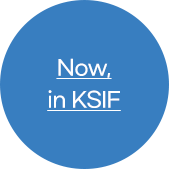
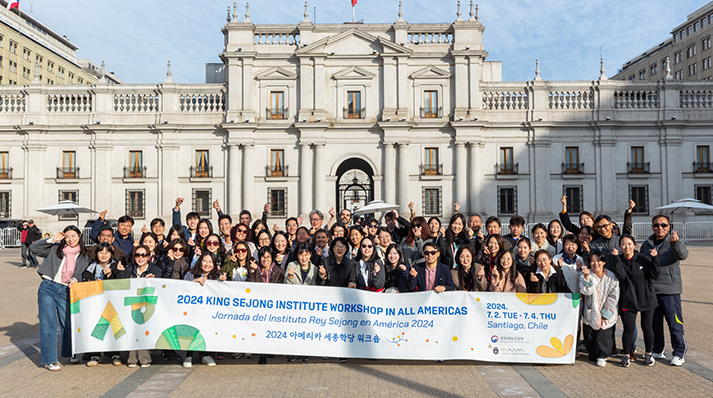
KSIF Successfully Concludes the 2024
King Sejong Institute Workshop In All Americas
>
Held in Santiago, Chile from July 2 to July 4, attended by approximately 200 Korean language
educators from the Americas
>
High responsiveness to re-education in necessary teaching methods for the latest educational
technology, Hanji, Hanbok, and K-beauty
The King Sejong Institute Foundation(President Lee Hai-young, hereafter referred to as the KSIF) successfully
held the 2024 King Sejong Institute Workshop In All Americas in Santiago, Chile, from July 2 to July 4. Since
2017, the KSIF has been organizing regional KSI Workshops to enhance the professionalism of Korean language
educators and share best practices in institute management. This year, fueled by the Hallyu wave and a growing
interest in Korean language education in the region, the workshop was held in South America. The workshop,
themed 'Enjoying Korean Language and Culture in the Americas,' saw the participation of approximately 200
people, including representatives from 25 KSIs and local Korean language educators across 14 countries within
the region.
*14 countries: Mexico, USA, Bolivia, Brazil, Argentina, Haiti, Ecuador, El Salvador, Uruguay, Chile, Canada,
Colombia, Paraguay, Peru
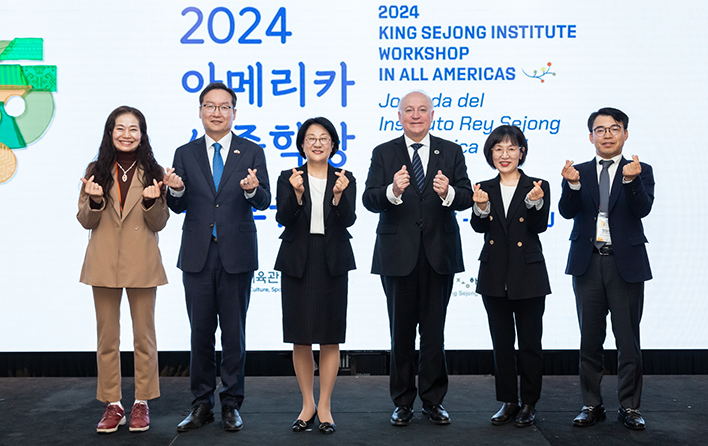 "2024 King Sejong Institute Workshop In All Americas" Opening Ceremony Commemorative Photo
(From left) Han Bo-wha, Director of the Korean Cultural Center in Argentina, Ambassador Kim Hak-jae from the
Embassy of the Republic of Korea in Chile, Lee Hai-young, President of the KSIF, Santiago Gonzalez, President of
Central University of Chile, Bang Sung-won, Director of the KSIF, and Jung Sang-won, Director of the Korean
Cultural Center in Los Angeles
"2024 King Sejong Institute Workshop In All Americas" Opening Ceremony Commemorative Photo
(From left) Han Bo-wha, Director of the Korean Cultural Center in Argentina, Ambassador Kim Hak-jae from the
Embassy of the Republic of Korea in Chile, Lee Hai-young, President of the KSIF, Santiago Gonzalez, President of
Central University of Chile, Bang Sung-won, Director of the KSIF, and Jung Sang-won, Director of the Korean
Cultural Center in Los Angeles
On the first day of the workshop, July 2, following the opening ceremony, there were special lectures by KSIF
President and presentations of excellent KSI management cases, as well as retraining in Korean language and
culture teaching methods useful for Korean language and culture education. The opening ceremony began with a
welcome speech by Ambassador Kim Hak-jae of South Korea in Chile, congratulatory speeches by Jung Sang-won,
Director of the Korean Cultural Center in LA, and Santiago Gonzalez Larrain, President of Central University of
Chile. Ambassador Kim expressed his delight that the "KSI Workshop" was held in Santiago, Chile, in response to
the Hallyu wave in South America, and hoped that the workshop would further spread the Korean language and
culture in the region.
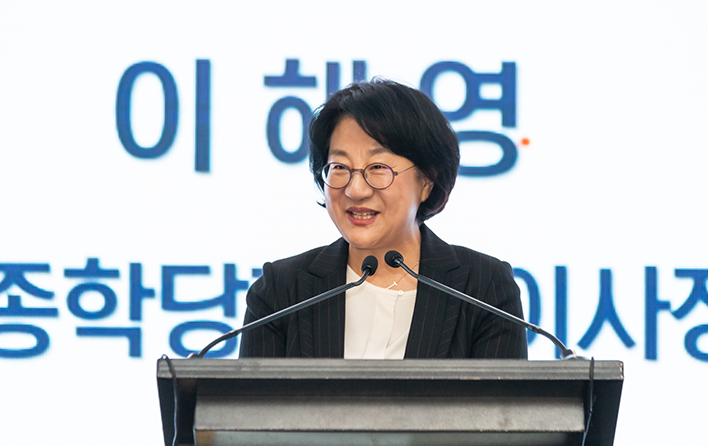 Lee Hai-young, President of KSIF, delivering the opening speech at the ‘2024 King Sejong Institute Workshop In
All Americas’
Lee Hai-young, President of KSIF, delivering the opening speech at the ‘2024 King Sejong Institute Workshop In
All Americas’
Following the opening ceremony, a special lecture titled, "KSI, Communicating with the World" by Lee Hai-young,
and a keynote lecture by Director Bang Sung-won on the direction of Korean language education and the role of
teachers were conducted. The presentation of excellent management cases from the KSI Korean Cultural Center,
Argentina shared valuable insights that could help other KSI representatives in the Americas manage their
operations effectively.
Especially, classes that utilized Korean cultural teaching aids and focused on practical activities received
enthusiastic responses. Specialists in various fields of Korean culture provided training in necessary teaching
methods on-site, covering topics such as Hanji (Paper Cultural Foundation by instructor Kim Jun-hyuk), K-beauty
(by guest professor Jeong Ho-seok from Woosong University), and Hanbok (by instructor Song Jin-ah from the
Korean Traditional Culture Center).
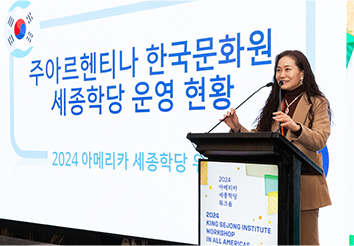
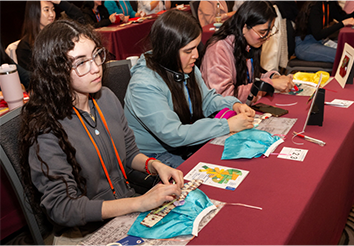
(Left photo) Han Bo-wha, Director, presenting an excellent operational case from the KSI Korean Cultural Center,
Argentina
(Right photo) Participants engaging in a Hanbok making session during the Korean culture teaching method
training
On the second day, July 3, professional training in teaching methods for Korean language education was conducted
for KSI representatives and local Korean language educators. In the morning, Professor Hwang Sun-young from Ajou
University lectured on the introduction and application methods of three types of basic textbooks, including the
newly published advanced KSI textbook for this year. Also, customized local education was provided by Professor
Kim Jae-wook from Hankuk University of Foreign Studies on teaching methods for Spanish and Portuguese
translation and interpretation textbooks, and Professor Kim Ji-hye from Ewha Womans University continued the
lecture on "Interculturalism in Korean Traditional and Modern Culture."
In the afternoon, practical training on the Sejong Korean Assessment (SKA) and the latest educational technology
(EdTech) utilization developed by KSIF was conducted. Professor Kim Ho-jung from Seoul National University led
the practical training on the introduction and application methods of SKA. Participants gained insights into
innovative Korean language education methods using the latest technologies introduced by KSIF, including
Metaverse KSI, AI teachers, and online KSI.
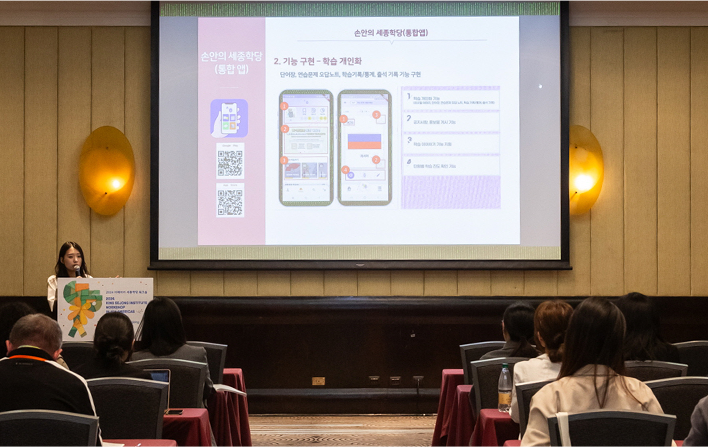 Participants attending a practical training on Korean teaching methods using educational technology (EdTech)
Participants attending a practical training on Korean teaching methods using educational technology (EdTech)
On the last day of the workshop, July 4, participants visited major historical sites in Santiago, such as San
Cristobal Hill and the Metropolitan Cathedral, to deepen their understanding of the local culture. The closing
ceremony featured a closing speech by the President of KSIF, followed by an awards ceremony for the video
contest conducted for KSI representatives, successfully concluding the three-day workshop schedule.
Kim Soo-jin, a teacher from KSI São Leopoldo, Brazil, who participated in the workshop, commented, "This
workshop was very beneficial as it provided an opportunity to learn more professional teaching methods and how
to utilize SKA, and it was especially informative to see the operational examples from other KSIs."
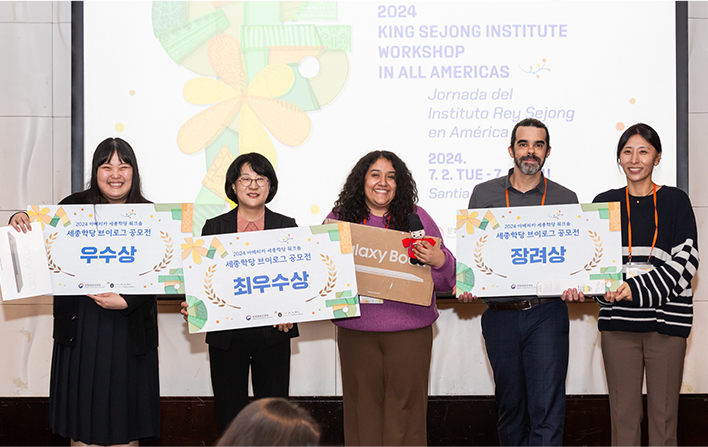 President Lee Hai-young of KSIF (second from the left) taking a commemorative photo with the winners of the 'KSI
Video Contest' at the closing ceremony
President Lee Hai-young of KSIF (second from the left) taking a commemorative photo with the winners of the 'KSI
Video Contest' at the closing ceremony
President Lee Hai-young stated, "I hope this workshop will further expand interest in the Korean language and
culture in the Americas, and we will continue to implement various projects that contribute to the development
of KSI operations, thereby enhancing the role of KSIs."